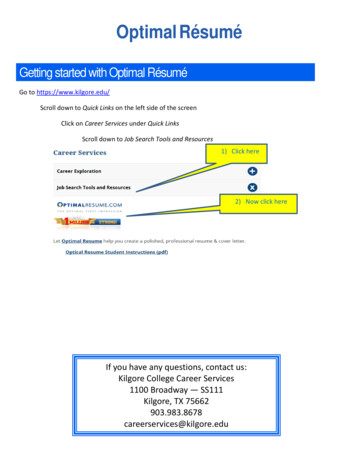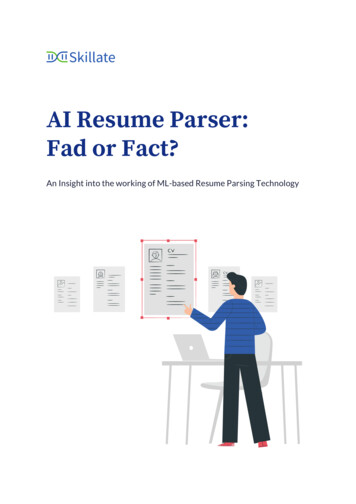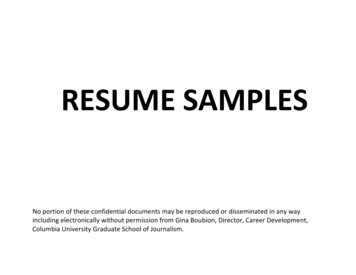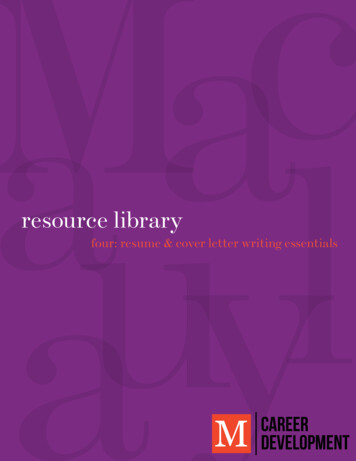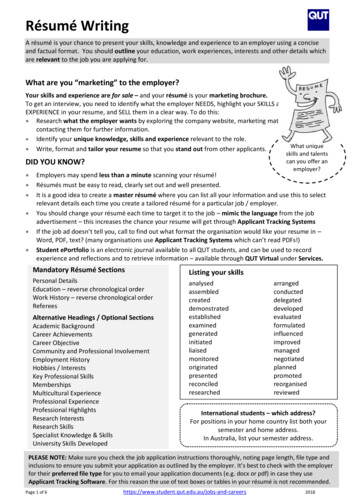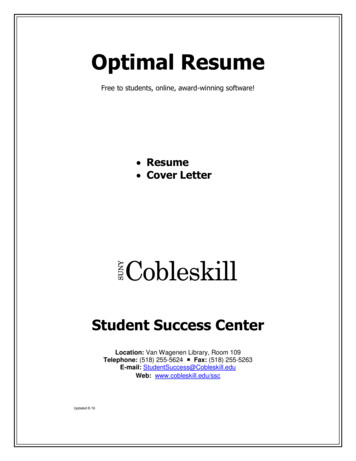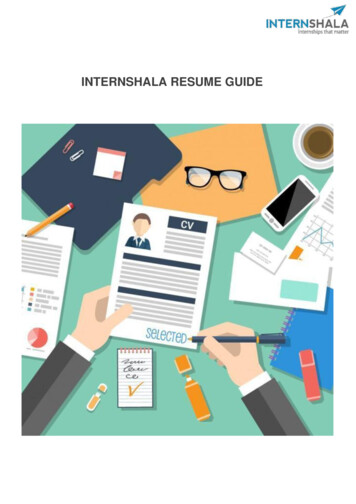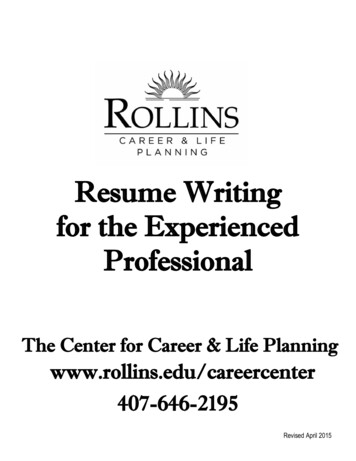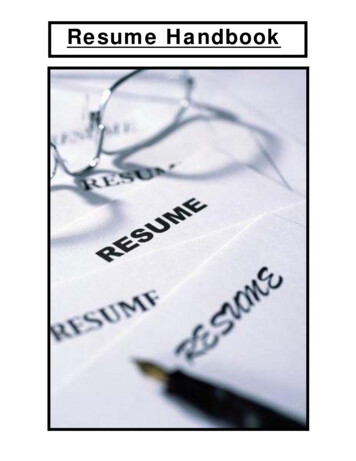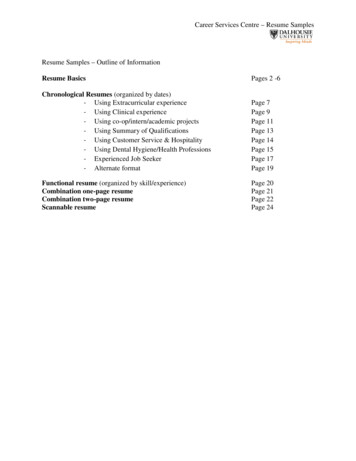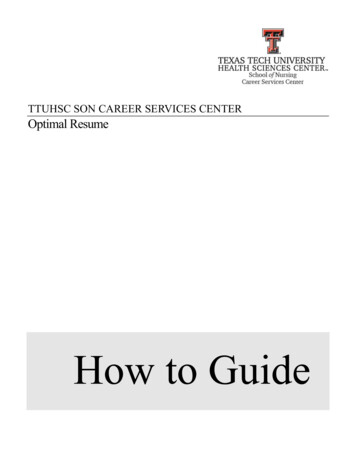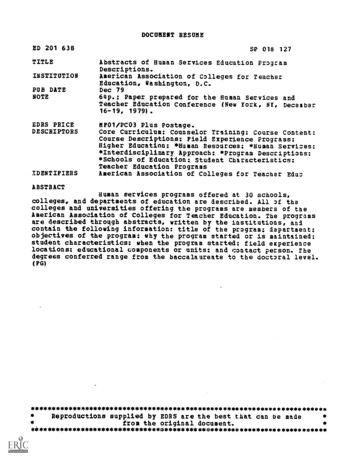
Transcription
DOCUMENT RESUMEED 201 636TITLEINSTITUTIONPUB DATENOTESP 018 127Abstracts of Human Services Education ProgramDescriptions.Aaerican Association of Colleges for TeacherEducation, Washington, D.C.Dec 7964p.: Paper prepared for the Human Services andTeacher Education Conference (New fork, NY, December16-19, 1979)EDRS PRICEDESCRIPTORSIDENTIFIERS.MF01/PC03 Plus Postage.Core Curriculum: Counselor Training; Course Content:Course Descriptions: Field Experience Programs:Higher Education: *Human Resources: *Human services:*Interdisciplinary Approach: *Program Descriptions:*Schools of Education: Student Characteristics:Teacher Education ProgramsAmerican Association of Colleges for Teacher !du ABSTRACTHuman services programs offered at 30 schools,colleges, and departments of education are described. All of thecolleges and universities offering the programs are members of theAmerican Association of Colleges for Teacher Education. The programsare described through abstracts, written by the institutions, andcontain the following information: title of the program: department:objectives of the program: why the program started or is maintained:student characteristics: when the program started: field experiencelocations: educational components or units: and contact person. Thedegrees conferred range from the baccalaureate to the doctoral *******************************Reproductions supplied by EDRS are the best that can be made*from the original *********************************
ABSTRACTSOFHUMAN SERVICES EDUCATIONPROGRAM DESCRIPTIONS"PERMISSION TO REPRODUCE THISMATERIAL HAS BEEN GRANTED BYU.S. DEPARTMENT OF EDUCATIONNATIONAL INSTITUTE OF EDUCATIONEDUCATIONAL RESOURCES INFORMATIONCENTER (ERIC)/17 er04rThis document has been reproduced asrecanted trot t the meson or organizationonItMinor changes have been made to improvereproduction quality.TO THE EDUCATIONAL RESOURCESINFORMATION CENTER (ERIC)."Points of view or opinions stated 111 INS document do not necessarily represent official NIEposition or policy.Prepared for the Human Services and Teacher Education Conference December16-19, 1979, New York, New YorkSponsored by The Commission on Programs and Projects of The American Association of Colleges for Teacher Education in cooperation with AACTE's AdvisoryCouncil of State Representatives and The AACTE of New York2
INTRODUCTIONDuring the past year, the American Association of Colleges for TeacherEducation (AACTE) through its Commission on Programs and Projects ar!da special task force has been exploring the area of human services andteacher education. In April 1979 a statement on Human Services andTeacher Education was published and disseminated to the AACTE membership.During the summer, the task force conducted a survey of AACTE memberinstitutions to ascertain the extent and nature of human services typeprograms offered by schools, colleges, and departments of education.Approximately 300 institutions indicated that they offered such programs. The task force then contacted these institutions and invitedthem to submit 6-page program descriptions and 2page abstracts of theirrespective programs. Responses were received from 30 institutions.The program descriptions were used by the task force as a basis forselecting 8 programs for presentation at the New York Conference onHuman Services and Teacher Education; the abstracts are included inthis compendium.The reader will note that the programs vary widely as to type and scope.The task force made no judgments about which abstracts to include ornot to include; all of those submitted are in this compendium.AACTE, its Commission on Programs and Projects, and the task forcehope that this collection of program abstracts will serve to illustratethe kinds of programs that are now being offered and to assist thoseinstitutions which desire to initiate programs in the area of humanservices and teacher education.Karl MassanariAssociate Director, AACTEFor the Commission on Programs and Projectsand the Task ForceDecember 1979
TABLE OF CONTENTSPageAlderson-Broaddus CollegeArizona State UniversityAuburn UniversityBoston UniversityGeorge Washington UniversityHerbert H. Lehman College, CONYIllinois State UniversityJohn Carroll UniversityKent State UniversityLesley College Graduate SchoolNew York UniversityNortheastern Illinois UniversityOakland UniversityOld Dominion UniversitySan Francisco State UniversitySouthern Illinois UniversitySt. John's UniversityUniversity of KansasUniversity of LouisvilleUniversity of MiamiUniversity of North FloridaUniversity of Northern IowaUniversity of Northern IowaUniversity of Rhode IslandUniversity of ToledoUniversity of Wisconsin-MilwaukeeUniversity of Wisconsin-OshkoshWashington UniversityWest Texas State UniversityWestern Washington 14345495153555759616365
Al.DIRSNI-RP'Annits CnLLEGFAbstractTITLE:Principles of Teaching and Learning for theNon-Education MajorWHO:Alderson-Broaddus College, Philippi, West Virginia 26416The program is lodged in the Education Department of the Collegeand is taught by Dr. Ruth Shearer, Professor of Education andPsychology.WHAT:The course is an elective for non-education majors and drawsmost heavily from students with majors in allied health programsnurses, radiologic technologists, medical technologists, andphysicians assistants. It appeals also to social work studentsand pre-ministerial students. It could be very useful to businessmajors but so far very few have taken the course.The course is a combination of two courses: educational psychology and secondary methods. It emphasizes learning theory andunderstanding learners during the first part of the course. Amedia workshop comes next; writing behavioral objectives, planning and preparation follows, and finally demonstration teachingis required.WHY:The program originated because Dr. Karl Myers, Sr. who foundedthe Radiologic Technology major at the College insisted thateducational psychology and secondary methods be required coursesfor all "Rad Tech" majors. He found that because these majorswere graduates of a degree granting program rather than a diploma(career school) program, they were often employed to teach othersin the situations where they found themselves.The Nursing Department of the College also views nursing oftenas a "teaching function" and directs many senior nurses into thecourse.WITHWHOM:See the above for characteristics of students enrolled. Thestudents graduate with a Bachelor of Science Degree for the mostpart. One's major dictates which Bachelor's Degree he receives,but it is a Bachelor's Degree.program only. The course hasenrolled annually 19-40 students.WHEN:The course was started in 1963.yields three hours credit.WHERE:Aside from media workshops and demonstration teaching required inthe course, clinical situations occur in relation to courses inthe students major fields. For example, all nursing studentshave assignments in their public health class that place them inthe public school-teaching students health practices. For theseexperiences they are required to write lesson plans, unit plans,and LAPS (Learning Activity Packets) -- skills learned in theEducation 33 course (Principles of Teaching and Learning).-5-5It is a one term course that
HOW:CONTACT:See attached Syllabus for the course.Dr. Ruth ShearerAlderson-Broaddus CollegePhilippi, West Virginia 26416Phone:College(304) 457-1700 ext. 221Home(304) 457-2100
AnI7PAA ST1TE TIP/FRSITYTITLE:Selected Studies in EducationWHO:Arizona State UniversityCollege of EducationSelected Studies in Education is a goal-centered, student-designedprogram. The process of defining and developing each curriculum involvesa statement of goals as well as the competencies and education experiThe student has access toence? which serve to achieve those goals.the offerings of the total university in tailoring his or her educational objectives.The multidisciplinary concept is continued in the governance andstructure of the program. Rather than exist as a separate and distinctunit, it transcends departmental lines in a very real sense. Theorganizational form and authority rest with a standards committeecomposed of representatives from the various academic departments anda student service center of the College of Education. No new resourcesThose professors already skilled in an areaor personnel were added.related to a promising new dimension of teaching need merely redirecttheir involvement to include this wider arena of activities.At least five major elements distinguish Selected Studies inEducation from more traditional programs.WHAT:Teacher education is expanded to include a broader base1.of human development.Teachers, advisers, student personnel specialists and2.students are drawn together into a closer relationship.Teaching options are offered alongside but are sub3.stantially different in content and intent from establishedprograms.It encourages and authorizes the preparation of a personalized education program which details the competenciesto be attained in order to meet the career objectives of the4.student.The total offerings of the university are accessible tothe student including specialized experiences via interdisciplinarycourse selections, field work, independent study and other lesscommon modes of learning.5.Experts agree that most of the learning enperiences occur outsideBusiness, government, the military, adultthe formal classroom.training, trade schools, anti-poverty programs, educational television,church and other similar centers of interest provide a vast array ofteaching opportunities where formal certification is unnecessary.Individuals in these and other similar positions need trainingin how to explore and analyze the dimensions of human development,understand the learning process, and apply appropriate teachingprinciples and techniques.WHY:WITH WHOM: Admission to the program is based on-(1) 56 or more earnedsemester hours, (2) a cumulative grade-point average of 2.25 or betterand, (3) a proposed plan of study approved by the Selected Studies inEducation Standards Committee. Graduates are awarded a Bachelor of Artsin Education degree.7
WHEN:The program was initiated in the Spring of 1975.Normally,students admitted to the program after their junior year can be expectedto have additional semester hours and time added to meet their degreerequirements.WHERE:Students explore courses and experiences available in the university community associated with their educational objectives. All ofthese experiences must be functional to the student in accpiring thenecessary skills and competencies and with respect to their ownaptitudes and the needs of the field. A minimum of six hours of fieldbased experience is required of each candidate. The setting fnr fieldwork is determined by the career'goal of the studenL. For example:GerontologyDental Hygiene EducationArts Development in CommunityEducation BroadcastingDance InstructionMontessori EducationBilingual Adult EducationTraining OfficerVeteran OutreachEducational Management SystemHOW:Retirement City Recreational CenterSchool of Dental HygieneCenrer for the ArtsEducational Television StationStudioMontessori Pre-SchoolAdult Basic Education ProgramNational Guard UnitCommunity Service AgencyScholl DistrictSelected Studies includes the following educational components:semester hours EDUCATION (interdepartmental concentration)Selected courses to provide a broad perspective of theeducational process.24* semester hours SPECIALIZATION (Interdisciplinary concentration)Designed by student and advisor according to student's needs andinterests.(*Student may combine with either Education and/orsupport structure, however, the total may not exceed 60 earnedsemester hours from the College of Education)27semester hours SUPPORT STRUCTURE (Related fields concentration)Courses available to create minor(s) or supportive competencey30areas 45semester hours GENERAL STUDIES (Core Curriculum concentration)Foundational courses in humanities, fine arts, behavioral/social sciences, science, mathematics and English/CommunicationsCONTACT:Kent M Christiansen, Ph.D.Director of Student ServicesB-2 Payne HallArizona State UniversityTempe, Arizona85281(602) 965-3878
A.11111 IT IHuman Services ProgranTITLE:WHO:PIPP,SMSchool of Education, Auburn University, 3084 Haley Center, Auburn ALThe prcgrzm is currently housed in the rehabilitation services department, but the program is interdepartmental. The faculty come from a varietyof backgrounds, but most have their advanced training in rehabilitation andcounseling.WHAT & WHY: The program described in this document is an outgrowth of twobasic needs. The first was the growing number of requests being receivedby Auburn University for individuals trained in the general area of humanservices at the undergraduate level. A second reed is the growing demandby graduate programs in huAan services, such as counseling and rehabilitation, for individuals who had a preparation at the undergraduate level inthe broad area of human services. The desired preparation goes teyond thatThese twonormally experiEnced in an undergraduate psychology program.expressed needs led to a careful examination of our undergraduate rehabilitation program at Auburn University. That review began in 1977 with anexternal task force appointed by the Dean to review the entire undergraduaterehabilitation program. An internal committee was appointed by the Deanand began the process of developing a broader human services option .vithinthe School of Education. The proposed human services education program iscomposed of three essential components. At the first level undergirdingthe entire program is a general education program consisting roughly of 63quarter hours. These 63 hours consist of those courses normally ccnsideredpart of a liberal arts background. The second stage of development is whatwe refer to as the human services pre-professional core. This core consistof roughly 100 hours and is equivalent to a period of roughly two years.The course content in this component comes from the areas of education(15 quarter hours), psychology (14 quarter hours), exceptionality (25 quarterhours). The third component of the program is described then as theThe purpose of this comspecialty level and consists of 48 quarter hours.ponent of the program is to provide the student with entry level job skillsin a particular area. Examples of specialty areas already developed include: vocational evaluation, placement, adjustment services, counseling.It is anticipated that other specialty areas will be added in the nearfuture.WITH WHOM:Student Characteristics:Background:A.- exposure to some phase of human services through family or personalexperiences- volunteer work with individuals which resulted in career interests- general interest in working with peopleB.Motivation:- relationship with others in the field- previous exposure to human service delivery through personal orfamily experiences- faculty-student interactionsC.Degrees offered:Undergraduate major: B.S. Education, Specialty areaor advanced pre-professional preparation-9-
WHEN & WHERE:The program originated in 1979.Content of ProgramA.General: Development of pre-professional competencies in the field ofhuman services for those who view the program as terminal.B.Specific:- Development of interpersonal skills for healthy helping relationships- Knowledge of vocational, social, physical, psychological and educational aspects of disabilities, exceptionality, and normal development- Skill development in vocational evaluation, adjustment services andpre-counselingC.Coursework - experiential requirements:(1) A.U.: general education program: (63 hours)(99 hours) foundations of(2) Human Services Pre-Professional Core:human services(3) Human Services specialty: (48 hours)(a) vocational evaluation(b) adjustment services(c) pre-counseling(d) corrections(or)advanced pre-professional preparation:for advanced graduate studyCONTACT:Dr. Richard W. Warner, Jr.Associate Dean, School of EducationAuburn University3084 Haley CenterAuburn, AL 36830(205) 826-4446 (Office)Prione:-10-(48 hours) preparation
PRCTrf IIPIT' /RC TYECSTCN UNIVERSITYHOGAN, tguSSICHUSETI'SABSTRPCTTITLE:Progran in Humanistic Education and Human ServicesWHO:Division of Humanistic, Developmental, and OrganizationalStudies at Boston University.The faculty have background and dortorates in the fieldsof philosophy, history, psychology, or sociology, as wellas extensive experience in education or other Moran services.WHAT:WHY:The program is designed for experienced practitioners orfor those who seek to work in schools, omminitycolleges,universities, hospitals, rental health centers, prisons,drug rehabilitation centers, and other human service agencieswho wish to eouip themselves with the necessary knowledgeand skills to humanize organizations, to work humanely wrihinbureaucratic structures, and to design humanistic alternativesto existing patterns.The underlying philosophy of the program is humanistic.Humanistic education is defined as a process through wIichpeople are helped to become more energetic, creative, productiveand effective in the world through gaining self awareness,interpersonal competence, and mere powerful methods of analysisand synthesis.WITHWHOM:The students are either experienced human service professionalsor people seeking to prepare for a role in a human serviceeachfield. The degrees offered, and the number of graduatesyear are:10Baccalaureate:20Master's:Certificate of Advanced Graduate Study: 430Doctorate:WHEN:The program began in 1974. The credit hours required andaverage time taken to complete all requiraments dit HoursAl.ed323032Average Time ToComelete Program4 years1 year1 year2 years
MERE:All degree levels require a combination of regular coursework and supervised field experience. The field settings includeschools, hospitals, drug rehabilitation centers, prisons, colleges,mental health centers, social work agencies.HOW:The prognmnomphasizes self-awareness, group leadership andgroup merkerzihip skills, research and consultation skills, andunderstanding of authority, power, values, change, creativity,and curriculum.CONTACT:Professor Paul NashDirector, Division of Humanistic, Developmental andOrganizational StudiesBoston University232 Bay State RoadBoston, 2,101 02215Telephone:(617) 353-3297
FIRGF NASHINGT(IN UNIVERSITYTITLE:The Bachelor of Arts in EducationDegree Program in Human ServicesWHO:The George Washington University offers a program of study inHuman Services within the School of Education and Human Development.The program is coordinated by a full-time faculty member with a background in counseling and administration of humanservice agencies. Other full-time faculty involvedthe program are in a variety of related disciplines such as: Human Resource Development, Higher Education, Counseling, Human Development, and Administration.WHAT:The program is designed to prepare students as generalists inthe" field of Human Services with the opportunity for individually planned, interdisciplinary study and specialization. The objectives of the program are: to enable individuals to developtheir cognitive and affective abilities so they are effective inhelping others; to meet a range of human service needs of peoplein today's and tomorrow's society; to develop human interactionand leadership skills in a changing society; to prepare studentsfor entry into or to advance in human service occupations; togain an awareness and appreciation for interacting values in apluralistic society; and to prepare students for graduate studyin a helping professional field. The areas of specialization available for a student to concentrate in could prepare him/herfor entry or advanced level positions working with some of thefollowing populations: children in day care; the handicapped; theelderly; the learning impaired; and adolescents and adults in vocational, recreational, or educational settings.WHY:The program was developed in response to a perceived need amongparaprofessional medical (and other human services) personnelfor a non-clinical Bachelor's degree program as well as in r2sponse to a need among younger undergraduates who sought an alternative to a liberal arts curriculum.WITH WHOM: Currently over seventy on-campus students are enrolled as humanservice majors (both full and part-time) and over seventy parttime students are enrolled in the off-campus program in HumanServices. To date, only three have graduated with their B.A. inEducation.WHEN:The degree program was first offered in the Fall of 1977 and requires a total of 120 semester hours of coursework and field experience. A full -time student would take four years to completethe requirements. Most part-time students enroll with advancedstanding and take one or two courses a semester.Summer coursesare available.-13-13
WHERE:The student's program requires a variety of field experienceswithin each course as well as a six semester hour supervisedfield experience chosen in alliance with the student's areaof interest and career goals.HOW:In addition to the liberal arts requirements, electives, andarea(s) of concentration to be individually planned, the studentwill take a core program designed to develop the follcwing skillsand areas of competency: human development; learning and teaching; communicating and interviewing; organization and administration; supervision and consultation; social issues; group theoryand techniques; and field experience.CONTACT:Ann H. MacomberDepartment of Education"C" BuildingGeorge Washington UniversityWashington, D.C. 20052(202) 676-3993
HFRRERT H, LFRIANTITLE:Cl NYPROGRAM FOR ALTERNATIVE CAREERS IN EDUCATIONWHO:Herbert H. Lehman College, CUNYThe program is housed on the main campus of the college and isclose to the agencies served by the program. Faculty assigned to the program are volunteers and represent varied disciplines in the Division ofProfessional Studies.WHAT:The main objective of the program is to prepare students in the lasttwo years of college for careers as educators in alternative non-publicschool institutions.At the same time, students are eligible for New YorkState elementary and secondary certification. Students pursue a contractlearning system through which they define their academic and life goals aseducators and design a contract with the assistance of a faculty adviser.Academic requirements are met through advisement both on and off campus.An intensive supervised internship is also required.Generic study areasare required of all students in order to prepare them for employment orgraduate school in varied disciplines and settings.Students prepare to teach in museums, zoos, senior citizen centers, early childhood centers, special education centers, historical societies, mental health centers, hospitals, drug rehabilitation centers, community centers, prisons, neighborhood houses, group homes, etc.Some students both teach and work as counselors in special projects. The age rangeserved has no bottom or upper limit.Each student leaving the program will have teaching skills forvaried age groups and disciplines served in alternative settings.In addition, some students will achieve competencies in counseling and groupwork.Many of the students will be prepared for graduate school in severaldisciplines.WHY:The program began in 1973 as an answer to the needs of a decliningjob market for public school teachers and the desire of many undergraduatestudents to prepare for careers as educators. Program faculty conducted aneeds assessment for educators in alternative agencies in the New York metropolitan region and found that while public schools were contracting thealternative agencies were expanding. In adiition, a need for a programwhich taught students how to create their own careers where none existedwas determined.WITH WHOM:Students enrolled in the program are liberal arts juniors andseniors seeking the B.A.degree. Approximately 150 students have gradtatedfrom the program with theB.A. degree. Students currently enrolled in theprogram are mainly Hispanic and Black. Many students are married and havechildren and must work part-time to support their families. Many of thestudents are between the ages of 25-35.WHEN:The program was initiated in 1978. Students spend from one to twosemesters in the program and complete 17 to 32 credit hours. Students takefrom one to one and one-half years to complete all program requirements.WHERE:The typical student spends one day a week on campus and four fulldays at an agency in the field. A typical field setting would require thestudent to work with an agency population one-on-one, small groups and largegroups.The student would be closely supervised by agency personnel andattend all agency meetings and workshops. The agency would regard the15-15-
student intern as a potential candidate for employment and insure that thestudent participates in all staff activities. The New York BotanicalGarden, for example, would have the student teach classes visiting theGarden both indoors and outdoors. A Garden staff member would assist thestudent in preparing to teach these classes and would give the student acritique with suggestions for improvement at the end of the day.HOW:There is no formal course structure in the program.All studentsdesign an individual learning contract and proceed to fulfill contractgoals.Contract goals are achieved through independent study, tutorials,workshops, seminars and advisement. Students seeking New York State elementary or secondary certification are required to achieve specific competencies mandated by the state. All students are advised to achievegeneric competencies, e.g., the organization of learning; assessment ofstudent functioning and achievement; management of groups; dynamics ofinterpersonal relations; and a supervised intensive internship. Otherspecific competencies depend on the specific area chosen by the student.CONTACT:Professor Bernard FlickerPACE ProgramCarman Hall, B-20BHerbert H. Lehman College, CONYBronx, N. Y. 104681E;-16-
111.1"niS STATE IVITRSITYAbSTAACTTITLE:WHO:Human Services EducationIllinois State UniversityHuman Services Education is one of several sequences (alongwith school counseling, counseling in higher education, and.counseling in agency settings) in the Counselor Educationprogram housed in the Department ofSpecialized EducationalDevelopment, College of Education.Although supervised primarily by staff trained in counseloreducation, the program is interdisciplinary in nature involvingfaculty from the departments of. Sociology, Psychology, homeEconomics, Educational Administration and Foundations, Curriculum and Instruction, business Administration, and InformationThe faculty has had specialized training in consulSciences.tation, program development and evaluation,. group processes,and social system' assessment and has had extensive experienceconsulting with organizations, institutions, and communities.The program in Human Services Education seeks toaccomplish the following objectives:To teach students how to assess the effects of environ(1)mental systems on human behavior.To teach students how to design, deliver, and evaluate(2)educational, developmental, and preventive interventionswhich promote effective human--environmental systeminteractions.To teach students how to perform educational consultation(3)with clients and/or client groups.WHAT:The orientation of the program is neither intra- nor interpersonal but ecological, viewing human behavior within thecontext of environmental settings. It emphasizes the attainment of knowledge and skill in the prevention of educationaland psycho-social problems, the enhancement of life skills, andenvironmental design.Surveys of prospective employers in student affairs unitsof institutions of higher education and community serviceagencies in Illinois indicate a need and a desire to hiregraduates from the Illinois State University Human ServicesSixty percent indicated a staff'openingEducation program.within the past year for which they would consider a graduate.of this program.WriY:The program has attracted students with variedWITH WHOM:backgrounds and interests including:College graduates from the social, behavioral, and applied(1)sciences who wish to prepare for master's level humanservices education positions or who intend to pursuedoctoral studies in this area.Currently employed professionals who are interested in(2)skill training in areas of consultation, program development, staff development, and social system change.-17-17
The basic program in human Services Education at Illinois StateUniversity leads to a master's degree in Counselor Education,Qualified students may also be admitted to a College of Educu.tion doctoral program with a human services education emphasis.The Human Services Education program was established atIllinois State University in 1978. The master's degree programrequires a minimum of 42 semester hours and can be completed inan academic year and two summer sessions of full-time graduateWHEN:work.Seventy-threeThe program is experiential in nature.percent of the 11 core courses have laboratory components andstudents are actively involved in significant community basedSix semester hours of practicum experience areprojects.required in human service education and life skills developmentprograms in settings such as university and community counseling services, health care facilities, and social agencies.WHERE:Students in the Human Services Education program areexpected to take:(1) Courses which provide basic foundations in consultationtheory and practice (18 semester hours)basic Skills in Counselor.kAucationTheory and Practice in Group Counseli
Alderson-Broaddus College 5 Arizona State University 7 Auburn University 9 Boston University 11 George Washington University-13Herbert H. Lehman College, CONY 15 Illinois State University 17 John Carroll University 19 Kent State University 21 Lesley College Graduate School-23New York University 25 Northeastern Illinois University 27 Oakland University 29 Old Dominion University 31
